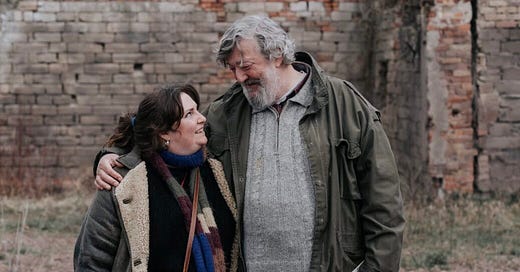What Lena Dunham's "Treasure" Got Right About Jewish Heritage Trips...and Wrong
It's not uncommon for Holocaust survivors to run away from their trauma while their descendants run towards it, but the emotional truth behind that discovery is missing in this film.
(Spoiler alert! I will be revealing aspects of the plot in the following post.)
Growing up, my dad had this quirky saying that I was sure carried more meaning in its original Slovak than it did in his English translation. It went something like this:
“When they give, you take. When they beat, you run.”
I know, I know, but the jarring syntax and the elusive “they” aside, I understood the crude meaning of the phrase to be: know when someone is hurting you and act accordingly. Also, know when someone wants to treat you well and learn how to accept those gifts graciously. As a child that seemed absurd; of course you run if someone is trying to hurt you. I always took any gift that was offered to me.
As an adult, I realize that it’s not that easy.
That motto may as well have been the underlying theme for Treasure, a new film featuring Lena Dunham and Stephen Fry about a father and daughter (or daughter and father if you watch the film) who return to Poland on a heritage trip.
The trip has been meticulously planned by Ruth (Dunham’s character), a 36-year old journalist from New York who is still reeling from her mother’s death a year earlier and who mysteriously divorced her husband not long ago. We learn early on that both of Ruth’s parents were Holocaust survivors imprisoned in the Lodz ghetto before being deported to Auschwitz. While the couple survived, their family members did not.
Ruth’s father, Edek (played by Stephen Fry) has no interest in returning to Poland but insists on tagging along in order to watch over his daughter and only surviving family member. Edek spent a lifetime trying to forget about war, telling Ruth almost nothing, and takes this trip as an opportunity to further sabotage her research.
Phew. I think I got the basics.
Now what did they get right?
As a daughter of an Eastern European father born during the war, Stephen Fry’s character seems bang on — from the laissez-fair attitude towards clothes, to speaking with strangers, to being completely indifferent to certain social norms (he missed his plane because he wanted McDonald’s.) Also, many survivors never wanted to talk about their stories to their children, downplaying the severity while recreating a new existence for themselves outside of Europe. That internalized amnesia, of course, leads to problems, which the film accurately tackles, including:
A strained father-daughter relationship from years of not opening up.
For children, the internalized fear knowing something terrible happened but not able to put a finger on it, leading to distrust of partners, or really any outsider.
The need to be perfect to make up for the loss, which can lead to things like eating disorders, etc.
The lack of knowledge can also lead to an obsessive curiosity that some find macabre (uh, welcome to my world.)
What the film got wrong:
Where to start! As a filmgoer who normally starts crying during the previews and commercials and rarely stops until the final credits (I once cried through an entire oatmeal commercial) this father-daughter road trip to examine their family’s genocide really struggled to hit even a minor emotional note.
Ruth comes across as petulant and spoiled. As my friend who watched the film with me observed, does Ruthie need to be so fucked up? (My words not hers.) She has an eating disorder, she smokes, she is self-righteous, she has problems keeping relationships, she appears to have no insight into her father’s psychological state. In an early scene, she can’t understand why her father doesn’t want to get on a train. In Poland. If this is supposed to be a wink-wink nod-nod to the audience being smarter than this, it’s nauseatingly obvious.
When we discover that Ruth self-harms in the form of tattooing herself at night to produce her father’s Auschwitz tattoo, it almost put me over the edge. I couldn’t help but think of Girls, when Dunham’s character pierced her eardrum with a Q-Tip. It was just too much. She lives in NYC — surely she can find a good tattoo artist to do this for her, if she weren’t so messed up.
(NB: If you or anyone you know has a Holocaust remembrance tattoo, please contact me. I’m endlessly fascinated, despite being grossed up by this scene)
Ruth (Ruthie to her dad) is just generally unlikeable. She yells at the locals for calling Auschwitz a museum rather than a death camp not once but twice. She yells at strangers in an elevator for laughing in Polish. She storms off when she realizes her dad has hooked up with one of the two women they befriended (I’m sorry, but this seemed so bizarre. What 36-year old woman who grew up with an Eastern European father that easily discusses sex and who is comfortable with his body would be shocked to know her dad still wants to do it.) We want to see Ruth grow emotionally … but she never really does.
Ultimately, the film lacks nuance. Ruth never broaches the topic of Polish culpability. That was a hot topic in the 90s, when the war was reframed as only a German-instigated problem. Poland continues to rewrite history and has even made it a crime to accuse the country of involvement. When I visited Auschwitz in the 90s, one of the first things that blew mind was how close the town was to the death camp.
(You can read my piece on my visit here or below.)
The film tied up (too neatly) in the end with her father revealing the “treasure” of papers that will prove ownership of their assets stolen in the war. I understand the filmmakers were suggesting a double-entendre, that the treasure is their father-daughter relationship, that they are now talking about what happened to Edek during the war, that Ruth now knows about her lost family members. But it’s really rushed and frankly Ruth doesn’t come across as evolved enough to appreciate this deeper treasure.
“Now you can go back and claim what was lost,” Edek tells Ruth and this really hits a sour note for me. It presents as more vengeful against the Polish family who overcharged them for their family heirlooms than anything else. Retribution — even a hint of it — isn’t a good look. It also misses the point that there is no quick fix when looking back, and even fighting for a decrepit building (which I imagine is no easy feat to reclaim) will not return Edek’s family.
Best Moment:
Despite what I think was a missed opportunity with this film, I’m so glad they made it. Their mistake was trying to pander to a broader audience. Larger chunks of this film should have been in Polish with no transcription, so that the audience can feel as isolated as Ruth. The ending should not have been so tidy (here is a box of proof that we own this factory and apartment buildings and now they can be all yours!)
However, there is one scene that will stick with me for a while. During Ruth’s first night in Poland, she falls into a fitful sleep. We watch as a bug lands on her arm. Then a second. Then a third, which she desperately tries to swat away. Frantic, they are everywhere and suddenly she can’t seem to smack them fast enough. They are bed bugs, the viewer assumes. Except when she turns on the light, nothing is there. Not even the remnants of the dead. They are all gone.
That my friends, is the real essence of what this film should be.










Wow, Leah. As you write, where to start?
First off, excellent review--thoughtful, reflective, and, from the sounds of it, generously charitable. I just looked it up, and "Treasure" was written and directed by Julia von Heinz, a German filmmaker born in the early 70s (in the "in-between," we might say) and based on Lily Brett's award-winning "Too Many Men." With that in mind, the story's artless presentation is even more fraught.
What does Holocaust memory look like when it is refracted through so many lenses? Not just through the experiences of the child of a Survivor, but also the interpretive gaze of someone born in the age of German regret?
And then there's the question of who gets to hold the light. There was a fantastic essay about German "performance of Jewishness" in the Baffler that comes to mind: https://thebaffler.com/latest/how-german-isnt-it-cocotas
What I find interesting about this is that we also wished Hannah would grow, evolve, or at least try to. Lena Dunham is one of those polarizing Hollywood characters who seems to typecast herself. Excellent review! Thank you for sharing.